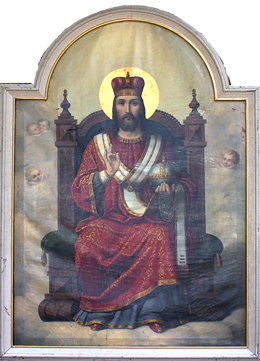Translate This Page
Christ the King
by Reverend Danny Rhoades
worship prescribed in the Law. These policies led to invasion by foreign armies, the death of many people, and ultimate deportation of the entire kingdom. Even in the restoration of Israel to Jerusalem and in the rebuilding of the temple and city walls, Israel remained engulfed by larger empires. Israel needed a king, a deliverer, a restorer. All the prophets announced that one would come whose kingdom would bring peace and extend to the furthest parts of the earth.
After four hundred and thirty years of waiting, Zechariah the high priest received a message from God. An angel announced that his wife Elizabeth would bear a son in her old age, and that son, John the Baptist, would prepare the way for the Messiah. Six months later, an angel appeared to Mary and then to Joseph announcing that they would be the parents of a miraculously conceived child. This child would be the Messiah, who was to be called Jesus because he would save his people from their sins.
In Bethlehem, as foretold by the prophets, Jesus Christ the Messiah was born in a stable. The announcement of his birth spread to two groups of unlikely people in unique ways. A group of shepherds received the announcement by means of a host of angelic beings singing, “Glory to God in the highest and on earth peace toward men.” In a far away Eastern land, a group of wise men received the message through unusual constellations. Following a star, they arrived in Jerusalem two years later and worshiped the Messiah.
Christ’s entrance into the public realm did not go as the Jews planned. John did pave the way through preaching about the kingdom of God and baptism of repentance, but no mention was made of a revolutionary political leader. Many thought he was crazy. Christ’s public ministry involved an attack on hypocritical religious activity instead of reforming oppressive political anarchy. The people who expected a Messiah to bring redemption became the focal point of Christ’s reformation teaching. He did perform incredible miraculous signs like healing cripples, turning water to wine, and even raising people from the dead. But he instructed people to “give to Caesar what belongs to Caesar.” And he instructed people to love their enemies. This could not be the king that was so greatly anticipated. Although they greeted him with shouts and waving palm branches, the Jews’ expectations were not met.
After four hundred and thirty years of waiting, Zechariah the high priest received a message from God. An angel announced that his wife Elizabeth would bear a son in her old age, and that son, John the Baptist, would prepare the way for the Messiah. Six months later, an angel appeared to Mary and then to Joseph announcing that they would be the parents of a miraculously conceived child. This child would be the Messiah, who was to be called Jesus because he would save his people from their sins.
In Bethlehem, as foretold by the prophets, Jesus Christ the Messiah was born in a stable. The announcement of his birth spread to two groups of unlikely people in unique ways. A group of shepherds received the announcement by means of a host of angelic beings singing, “Glory to God in the highest and on earth peace toward men.” In a faraway Eastern land, a group of wise men received the message through unusual constellations. Following a star, they arrived in Jerusalem two years later and worshiped the Messiah.
Christ’s entrance into the public realm did not go as the Jews planned. John did pave the way through preaching about the kingdom of God and baptism of repentance, but no mention was made of a revolutionary political leader. Many thought he was crazy. Christ’s public ministry involved an attack on hypocritical religious activity instead of reforming oppressive political anarchy. The people who expected a Messiah to bring redemption became the focal point of Christ’s reformation teaching. He did perform incredible miraculous signs like healing cripples, turning water to wine, and even raising people from the dead. But he instructed people to “give to Caesar what belongs to Caesar.” And he instructed people to love their enemies. This could not be the king that was so greatly anticipated. Although they greeted him with shouts and waving palm branches, the Jews’ expectations were not met.
After the crucifixion, Christ rose from the dead on the first day of the week. This event sparked the evangelization of the world through the twelve apostles. Their message focused on the fact that Christ is King and will judge all people when he comes again. This message cut to the heart of thousands, and many turned to Christ as their personal king. The New Testament also records that several surrendered their lives for the name of Christ, believing that to be the course their King desired them to take.
Revelation unfolds the story of the final coming of Christ. He will return as the King of the world. All nations will be subjected to His authority, and His arch-enemy Satan will be entirely defeated. In anticipation of this hope, many Christians live day by day seeking to please their coming King.

FARMED WITH LOVE
When we started to farm, it was just the two of us. Now we’ve got kids of our own and 10 employees who’ve become our extended family. We’re all here because we absolutely love what we do.

THE RIGHT WAY
There’s a lot of buzz about sustainable farming, and we couldn’t be happier. We’ve seen how much richer the soil is when we control weeds, pests and disease without toxic chemicals. We’re pretty sure it makes our harvest taste better, too.

ALL ORGANIC
We’ve farmed organic since the day we planted our first heirloom tomatoes over 30 years ago. It’s good for the land, and it’s great for you.




